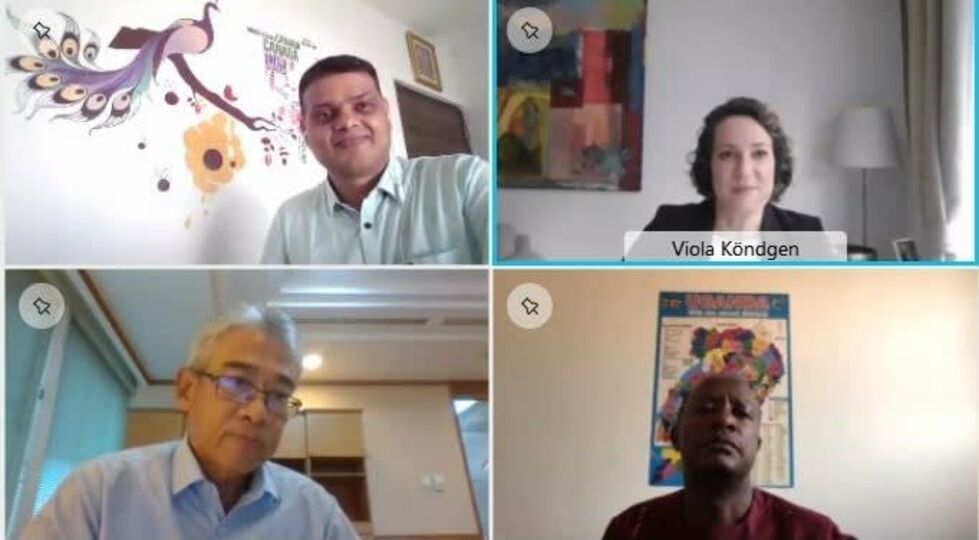Interregional Exchange on Compliance between Africa and Asia
08.06.2021
Africa and Asia, online

When talking about the fight against corruption, we refer to a global problem that does not stop at national borders. At the same time and in order to promote integrity effectively, local socio-economic conditions and cultural patterns need to be taken into account. Each country has different legal frameworks to curb corrupt business practices, yet successfully implemented approaches in one country can be transferred to other regions and help establish high integrity standards across borders. To promote this interregional exchange, the Alliance for Integrity, in cooperation with the Business Scouts for Development, organised a two-part dialogue series. Compliance experts from various countries in Asia and Africa shed light on current integrity issues that are being discussed globally. Which best practices already exist, what lessons have been learnt and what challenges can only be overcome together? These and other questions were at the centre of the event series.
The Covid-19 pandemic has led to a major shift in the normal way of doing operations which has equally resulted in an increase in risk. Risks are part of everyday business and can never be completely avoided, but companies that implement a comprehensive risk management system can identify and mitigate them in a timely manner. It is therefore a requirement for any good company to perform a proper risk assessment to safeguard its operations in the future.
With this in mind, the opening session focused on the topic of risk assessment. Compliance enthusiasts from the private and public sectors, civil society and academia from different parts of the world joined the panel discussion. The need for continued risk assessments, their importance and the processes involved were explained in more detail through practice-oriented inputs. “Risk assessment helps institutions to be proactive rather than reactive”, stated Reindorf Atta Gyamena, former Head of Compliance AMLRO at Calbank PLC Ghana. For any organisation that wants to build a strong compliance programme, a risk assessment is essential. Two aspects that are often neglected but play an important role are where the company is located and the industry in which it operates. “It is crucial to consider all influencing factors in the risk assessment and to perform it on a regular basis, preferably daily,” added Ganga Charen Sharma, Vice President, Supply Chain and Audits and Customised Services Business Streams for India, Middle East and Africa at TUV Rheinland India Pvt. Ltd. The role of management in risk assessment should not be underestimated either. “Management has to give risk assessment the same priority as performance criteria,” added Christian Tors, CEO of Heat Exchange Products, Namibia.
The insights shared by the panelists were well received by the audience. “Risk assessment is necessary for any organisation to grow. It is not just the task of one person or a few people, but of the whole company”, highlighted one of the participants. Others agreed that the session was very valuable. In order to put the learnings into practice, the Alliance for Integrity offers a digital tool, TheIntegrityApp, which helps companies to identify and mitigate potential risk factors.
The new function is based on different situations in which an organisation may face corruption. It is able to measure whether the company is exposed to these risk factors and what internal measures need to be implemented to mitigate them. At the end of the assessment, users will receive a heat map and further information on how to efficiently address the identified risks.
The following session placed emphasis on the Responsibilities and Role of Compliance Professionals. Compliance officers do not always have an easy job to do. They are often seen as the corporate police, slowing down processes and complicating workflows. However, the pandemic in particular has shown that compliance officers play an important role in maintaining business continuity and creating resilient business models. In the panel discussion Rabindra Purohit, Head Legal, CS & Compliance at NIVEA India Pvt. Ltd., shared that a critical role of the compliance officer is to understand various roles of each department to coordinate better. It is a pre-requisite to develop a compliance programme that is reflective of the company’s values. He also emphasised that communication, honesty and integrity are essential features for a compliance officer to fulfil their role.
Robert Serwanga, CEO of Agrarian Systems Limited, Kampala-Uganda, spoke about the challenges compliance officers face on the job, including friction between teams. “Often there is overlap between audit functions and compliance. However, I recommend compliance officers not to mix these areas of responsibility.” Effective teamwork and the need for an inclusive approach are key elements in this context.
The organisational aspect of compliance also plays an important role. “The commitment of top management is crucial in the successful implementation of compliance mechanisms. This is the only way to ensure that compliance is lived, and that the integrity message is heard throughout the company. Transparency and integrity are key to compliance”, concluded Roy Iman Wirahardja, Compliance and Governance Director at PT Rajawali Corpora and Representative of the Indonesian Global Compact Network. On whether compliance is seen as a burden, he pointed out that comprehensive documentation and compliance acts as a blueprint for financial success in the long run, as it smooths processes, provides transparency and helps build trust between all stakeholders involved.
This interregional exchange, which highlighted both risk assessment and the role of compliance officers, met with a great response. More than 150 compliance enthusiasts from ten countries attended the two-part event series. Especially in times of crisis, interregional cooperation is significant to work together on holistic approaches and solutions. As a global initiative, exchange between regions remains a cornerstone of the Alliance for Integrity’s work. All upcoming events can be found here.
Authors: Seema Choudhary & Yvette Osei-Bonsu





